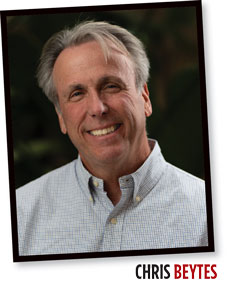11/1/2024
Three Truths
Chris Beytes

I’ve been involved in horticulture as a customer, a student, a grower, a greenhouse owner and finally a journalist since 1979, when I bought my then girlfriend/now wife three 6-packs of Cocktail Begonias at a Kmart store in Gainesville, Florida. Three for $2—even a poor college student could afford to buy his girl flowers at that price! Something snapped in her brain, she changed her major to ornamental horticulture, I came along for the ride and the rest, as they say, is history.
In that time, I’ve learned some truths about our little industry that make it the greatest—and I use that term with all sincerity—industry on the planet. Go ahead, name me a better one. Especially those of you who came here from the outside. I’ve asked many of you if you used to break bread or share a beer with your competitors and you just laughed.
Anyway, back to the truths I’ve discovered:
We are optimistic. Our eternal optimism becomes evident every time it rains on the weekend, every time Mother’s Day is a washout, every time a pest invades our crops, whenever spring falls short of our expectations. No matter how bad it gets, I’ve never heard a grower or retailer cry about it. B*tch a little, yes—who doesn’t? But we always believe it will get better, that we’ll make it up next weekend or next season. How often do we see a business owner throw in the towel and give up? Rarely.
In fact, we are optimistic to a fault, sometimes not accepting the reality of bad situations that might, to one extent or another, be of our own making. I’ve often heard it said that bankrupt businesses should have seen the writing on the wall five years before the doors closed for good. Optimism is great, but rose-colored-glasses optimism can be our downfall.
We are resilient. I first witnessed this in 1992, a year after I’d closed my own greenhouse (a decision that came from being realistic). I was working on getting my writing career going and the publication Nursery Manager asked me to go to Homestead, Florida, to write about the recovery efforts after Hurricane Andrew wiped out the industry there. And when I say wiped out, I mean it. One hundred percent of the South Florida plant industry was blown into the Everglades. It was a war zone. I was there just eight weeks after the storm and there was still little power and no telephones. Some folks bathed in “South Pacific” showers outdoors, powered by irrigation pumps. This was before cell phones and to make a call you had to drive east to U.S. 1 where banks of phones had been set up. It was challenging for me, a budding journalist, to poke around and ask questions during such a disaster.
But the growers I met made it easy. I remember the first guy I talked to. From a distance off of Krome Avenue, I spotted two utility trucks at work over what was left of a nursery. I thought, “Where there are utility trucks, there’s life,” so went up the drive. There I met the manager of the nursery, a young guy who told me he’d managed to salvage about an acre of crotons by jury-rigging some of the remaining shadecloth. He’d flagged down a passing out-of-state utility crew and—with the help of a couple cases of beer—convinced them to reconnect his power (without proper permit or inspection) so he could run an irrigation pump and save what remained of the crop. He wasn’t even the owner, but he was acting like it was his.
I met a dozen such folks in Homestead over the three days I was there, all of whom showed a resilience that has stuck with me. So it’s not surprising at all when I hear about growers in the aftermath of Helene and Milton saying, “We will rebuild. We don’t know how, but we will.”
We are caring. For every business flattened by a weather event or crippled by a fire, there are 100 who show up and ask, “How can I help?” Growers have lent pots and soil, shadecloth and poly—even greenhouse space to their fellow growers in need—even when they’re competitors. I think there’s a strong sense of “There but for the grace of God go I” among us. Plus, we know the real competition is not the grower or retailer up the street, but the other industries vying for the consumer dollar. I’m sure that’s happening now after Helene and Milton; it certainly happened in Homestead after Andrew, even among those who’d also lost everything.
Just as I was thinking of a way to wrap up this column, I got an email from my friend Matt Roberts, GM of his family’s business, Central Florida Ferns & Foliage near Apopka. One of their four locations got hit hard by what they assume was a tornado during Milton and Matt sent me photos of a flattened gutter-connect greenhouse range. His comment?
“This range was scheduled to come down and get rebuilt in 2025. Mother Nature just sped up our timeline.” He added a smiley face.
I rest my case. GT